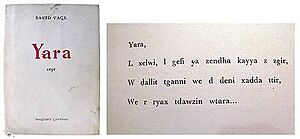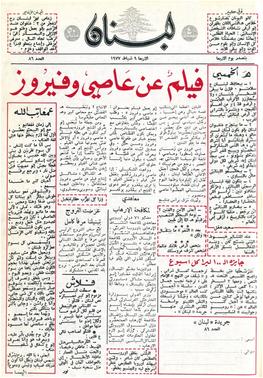Said Akl facts for kids
Quick facts for kids
Said Akl
Saýid Ýaql سعيد عقل |
|
|---|---|

|
|
| Born | 4 July 1911 Zahlé, Ottoman Lebanon |
| Died | 28 November 2014 (aged 103) Beirut, Lebanon |
| Occupation | Poet, philosopher, writer, playwright, linguist and ideologue |
Said Akl (Arabic: سعيد عقل, Saʿīd ʿAql; 4 July 1911 – 28 November 2014) was a famous Lebanese poet, thinker, writer, and language reformer. Many people see him as one of the most important Lebanese poets of modern times.
He is well-known for wanting to make the spoken Lebanese Arabic language its own official language, separate from Standard Arabic. He even created a new way to write Lebanese using a modified Roman alphabet with 36 symbols. He believed this new alphabet was a modern version of the ancient Phoenician alphabet. Even with these ideas, he also wrote many beautiful works in Modern Standard Arabic.
Said Akl wrote poetry and stories in both Lebanese Arabic and Classical Arabic. He also wrote plays and words for many popular songs. One famous song he wrote was Shal (Scarf), sung by Fairouz. An Egyptian composer, Abdel Wahab, called it "the most beautiful poem composed into a song in Arabic music."
About His Life
Said Akl was born in 1911 in Zahle, a city in what was then Ottoman Lebanon. His family was Maronite Christian. When he was 14, his grandfather passed away, and he had to leave school.
He later worked as a teacher and then as a journalist. He studied many subjects, including religion, literature, and Islamic history. He became a university teacher and gave lectures at many universities and schools in Lebanon. He lived a very long life, passing away in Beirut, Lebanon, at 103 years old.
His Beliefs and Ideas
When he was younger, Said Akl was part of the Syrian Social Nationalist Party. However, he later left the party because he had different ideas from its leader.
Akl strongly believed that Lebanon had its own unique history and culture, going back thousands of years. He felt very proud of Lebanon's past and did not want Lebanon to be seen as just another Arab country. He once said, "I would cut off my right hand just not to be an Arab." He even thought that literary Arabic might disappear from Lebanon one day.
For Said Akl, Lebanon was the birthplace of culture and had a rich civilization long before Arabs arrived. He often highlighted the Phoenician history of the Lebanese people.
He was known for his strong Lebanese nationalist feelings. In 1972, he helped start the Lebanese Renewal Party. This party was based on the idea of Lebanese nationalism. During the Lebanese Civil War, Akl was seen as a spiritual leader for a Christian group called the Guardians of the Cedars.
Lebanese Language and Alphabet
Said Akl strongly supported the idea that the Lebanese language should be seen as separate from the Arabic language. He knew Arabic had influenced Lebanese, but he argued that Phoenician languages had influenced it just as much, or even more. He wanted Lebanese to be written using a changed Latin alphabet, instead of the Arabic alphabet.
He created his own alphabet for the Lebanese language. It used Latin letters, plus some new letters and special marks, to fit the sounds of Lebanese. His proposed Lebanese alphabet had 36 letters.
| position | Arabic graph | Akl graph | Classical name | Akl Levantine name |
|
|---|---|---|---|---|---|
| Akl | Hijā’ī | ||||
| 1 | 1 | ا | C with lower-left diagonal stroke | ’alif | c*aleef |
| 2 | 2 | ب | B | bā’ | be |
| 3 | 2 | پ | P | (pā’) | pe |
| 4 | 3 | ت | capital T, lower-case t without left stroke | tā’ | t*e |
| 4 | 4 | ث | [merges with te] | thā’ | t*e |
| 5 | 16 | ط | capital T with left stroke, lower-case t | ṭā’ | taah |
| 6 | 5 | ج | J | jīm | jiin |
| 7 | 6 | ح | X | ḥā’ | xe |
| 8 | 7 | خ | K | khā’ | ke |
| 9 | 8 | د | D | dāl | daal |
| 9 | 9 | ذ | [merges with daal] | dhāl | daal |
| 10 | 15 | ض | D with gap at top (lower-case like ⟨cl⟩ joined at bottom) | ḍād | d*aad |
| 11 | 10 | ر | R | rā’ | re |
| 12 | 11 | ز | Z | zāyy | zayn |
| 13 | 17 | ظ | Z with left stroke | ẓā’ | z*aah |
| 14 | 12 | س | S | sīn | siin |
| 15 | 14 | ص | S with top removed | ṣād | s*aad |
| 16 | 13 | ش | C | shīn | ciin |
| 17 | 18 | ع | Y with left arm curved clockwise | ‘ayn | y*ayn |
| 18 | 19 | غ | G | ghayn | gayn |
| 19 | 21 | ق | G with gap at top | qāf | g*e |
| 20 | 20 | ف | F | fā’ | fe |
| 21 | 20 | ڤ | V | (vā’) | ve |
| 22 | 22 | ك | Q | kāf | qaaf |
| 23 | 23 | ل | L | lām | laam |
| 24 | 24 | م | M | mīm | miim |
| 25 | 25 | ن | N | nūn | nuun |
| 26 | 26 | ه | H | hā’ | he |
| 27 | 27 | و | W | wāw | waaw |
| 28 | 30 | ـَ | A | fatḥah | a |
| 29 | 33 | ـَا | A with left stroke | fatḥah ’alif | a* |
| 30 | 31 | ـِ | I | kasrah | i |
| 30 | 34 | ـِي | I with left stroke | kasrah yā’ | i*, i (word finally) |
| 31 | 36 | ـَي | E | fatḥah yā’ | e |
| 32 | 29 | ـَ | E with truncation | fatḥah | e* |
| 33 | 37 | ـَو | O | fatḥah wāw | o |
| 34 | 32 | ـُ | U | ḍammah | u |
| 35 | 35 | ـُو | U with left stroke | ḍammah wāw | u*, u (word finally) |
| 36 | 28 | ي | Y | yā’ | ye |
From the 1970s, Akl started giving a prize for the best essay written in Lebanese. These "Said Akl awards" have been given to many Lebanese thinkers and artists. He published his poetry book Yara entirely using his new Lebanese alphabet. This made it the first book ever published in that form. Later, he also published another poetry book, Khumasiyyat, using the same alphabet.
Akl also published a newspaper called Lebnaan in the Lebanese language. It came out in two versions: one written in the traditional Arabic alphabet (called لبنان, or Lubnan), and the other Lebnaan using his new Latin-based alphabet.
His Works
Said Akl wrote many different types of works, including plays, long poems (epics), poetry, and song lyrics. His first published work was a play written in Arabic in 1935. He wrote in Lebanese, literary Arabic, and French. He is also famous for writing the lyrics to well-known songs, like Zahrat al-Mada'en, sung by Fairuz.
Here are some of his notable works:
- 1935: Bint Yifta' (a play) – (in Arabic بنت يفتاح)
- 1937: Al Majdaliyyah (an epic poem) – (in Arabic المجدليّة)
- 1944: Qadmos (a play) – (in Arabic قدموس)
- 1961: Yara (written using his special Lebanese alphabet) (in Arabic يارا)
- 1961: Ajraas al Yasmeen (in Arabic أجراس الياسمين)
- 1978: Khumasiyyat (written using his special Lebanese alphabet) (in Arabic خماسيّات)
In 1981, he also published poems in French.
See also
 In Spanish: Said Akl para niños
In Spanish: Said Akl para niños
- Phoenicianism
- Guardians of the Cedars
- Lebanese Arabic





